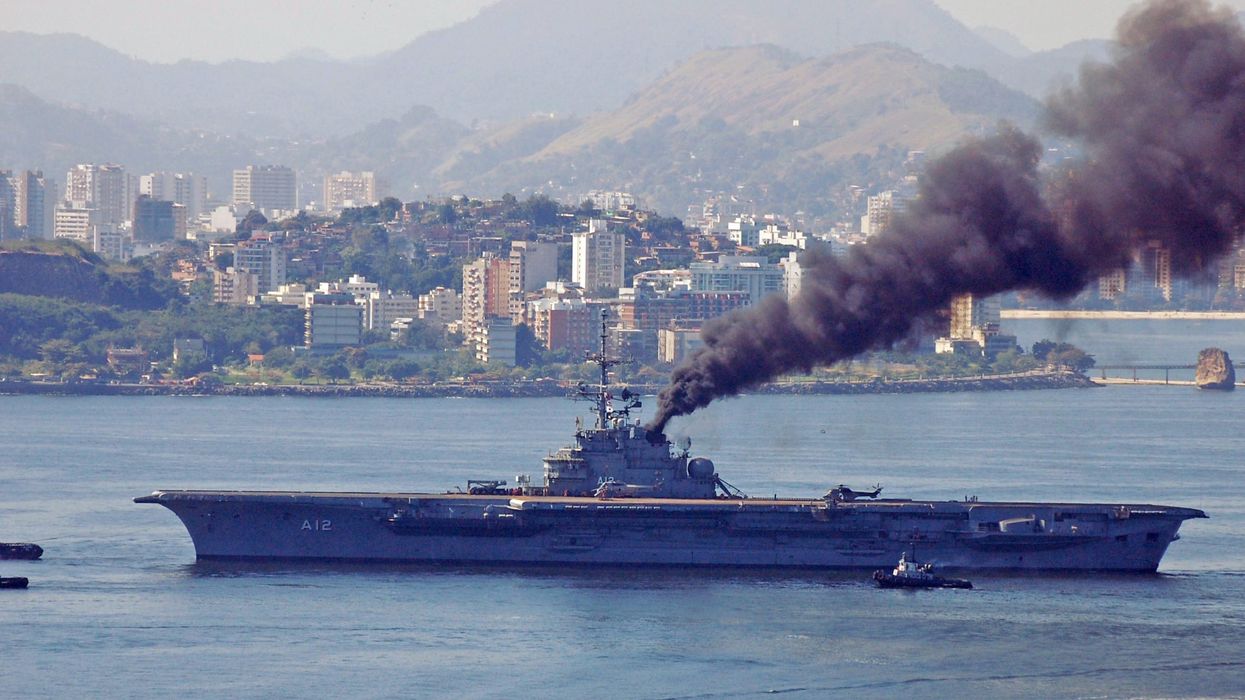Brazil Set to Sink 'Toxic' Aircraft Carrier at Sea Despite Environmental Concerns
Intentionally sinking the vessel "would equate to a state-sponsored environmental crime," said one shipbreaking expert.
The former flagship of Brazil's navy—an ex-French aircraft carrier built in the late 1950s that environmentalists estimate contains hundreds of tons of highly carcinogenic chemicals—will be scuttled at sea after being denied permission to be scrapped in Turkey, Brazilian naval officials said on Wednesday.
The NAe São Paulo (A-12), an 870-foot Clemenceau-class carrier first commissioned by the French navy in 1963 as the Foch, will be sunk using explosives about 217 miles off Brazil's coast in the country's exclusive economic zone at a depth of around 16,000 feet, Brazilian Environmental Minister Marina Silva said after a federal judge denied a government request to stop the sinking on environmental grounds.
"Given its deteriorating floating condition and the inevitability of uncontrolled sinking, there is no other option but to jettison the hull and sink it in a planned way," Brazil's navy said of the ship in a statement, according to Reuters.
Silva, and many environmentalists, did not want to sink the vessel, which contains an unknown quantity of toxic substances. French authorities said they believed there were 45 tons of asbestos—a common fire retardant at the time of the carrier's construction—onboard, although experts said the figure is likely higher.
"We're talking about a ship containing both hazardous materials and valuable materials—it's supposed to be brought into the territory of Brazil and managed in an environmentally sound way."
Basel Action Network (BAN), a Seattle-based NGO that works to stop the export of toxic waste to developing nations, estimates the São Paulo contains around 300 tons of highly carcinogenic polychlorinated biphenyls (PCBs).
Under pressure from environmental groups including BAN, Turkish authorities last September rescinded permission for the São Paulo to be towed to Turkey for scrapping after Brazilian officials could not provide a satisfactory list of toxic substances aboard the carrier.
BAN executive director Jim Puckett said that abandoning the São Paulo at sea would be an act of "gross negligence," as well as a violation of three international environmental conventions.
"We're talking about a ship containing both hazardous materials and valuable materials—it's supposed to be brought into the territory of Brazil and managed in an environmentally sound way," Puckett told Time. "You can't just sink it."
Nancy Wallace, director of the U.S. National Oceanic and Atmospheric Administration's marine debris program, concurred.
"Anytime there's a vessel that's left at sea, the first thing to think about is toxic chemicals, which can be very impactful to wildlife," Wallace said.
In a statement last month, Ingvild Jenssen, founder and executive director of NGO Shipbreaking Platform, asserted that "intentionally sinking this toxic aircraft carrier would equate to a state-sponsored environmental crime."
Brazil purchased the vessel from France for $12 million in 2000, and the São Paulo served as the Brazilian navy's flagship until it was decommissioned in 2018.
In a late twist, earlier this week a Saudi business group offered the equivalent of $6 million for the São Paulo's hull—three times the offer made by the Turkish shipyard that had tried to acquire the ship.
Puckett argued the vessel is simply too valuable to be scuttled.
"It's got millions of dollars worth of steel to be recycled, which far outweighs the cost of managing those hazardous materials," he contended. "I've never seen such a valuable ship being deliberately sunk."
